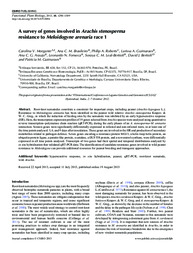A survey of genes involved in Arachis stenosperma resistance to Meloidogyne arenaria race 1.
A survey of genes involved in Arachis stenosperma resistance to Meloidogyne arenaria race 1.
Author(s): MORGANTE, C. V.; BRASILEIRO, A. C. M.; ROBERTS, P. A.; GUIMARAES, L. A.; ARAUJO, A. C. G. de; FONSECA, L. N.; BERTIOLI, S. C. de M. L.; BERTIOLI, D. J.; GUIMARAES, P. M.
Summary: Root-knot nematodes constitute a constraint for important crops, including peanut (Arachis hypogaea L.). Resistance to Meloidogyne arenaria has been identi fied in the peanut wild relative Arachis stenosperma Krapov. & W. C. Greg., in which the induction of feeding sites by the nematode was inhibited by an early hypersensitive response (HR). Here, the transcription expression pro fi les of 19 genes selected from Arachis species were analysed using quantitative reverse transcription?polymerase chain reaction (qRT-PCR), during the early phases of anA. stenosperma?M. arenaria interaction. Sixteen genes were signi ficantly differentially expressed in infected and non-infected roots, in at least one of the time points analysed: 3, 6, and 9 days after inoculation. These genes are involved in the HR and production of secondary metabolites related to pathogen defence. Seven genes encoding a resistance protein MG13, a helix-loop helix protein, an ubiquitin protein ligase, a patatin-like protein, a catalase, a DUF538 protein, and a resveratrol synthase, were differentially expressed in all time points analysed. Transcripts of two genes had their spatial and temporal distributions analysed by in situ hybridisation that validated qRT-PCR data. The identi fication of candidate resistance genes involved in wild peanut resistance to Meloidogyne can provide additional resources for peanut breeding and transgenic approaches.
Publication year: 2013
Types of publication: Journal article
Unit: Embrapa Semi-arid Region
Observation
Some of Embrapa's publications are published as ePub files. To read them, use or download one of the following free software options to your computer or mobile device. Android: Google Play Books; IOS: iBooks; Windows and Linux: Calibre.
Access other publications
Access the Agricultural Research Database (BDPA) to consult Embrapa's full library collection and records.
Visit Embrapa Bookstore to purchase books and other publications sold by Embrapa.

